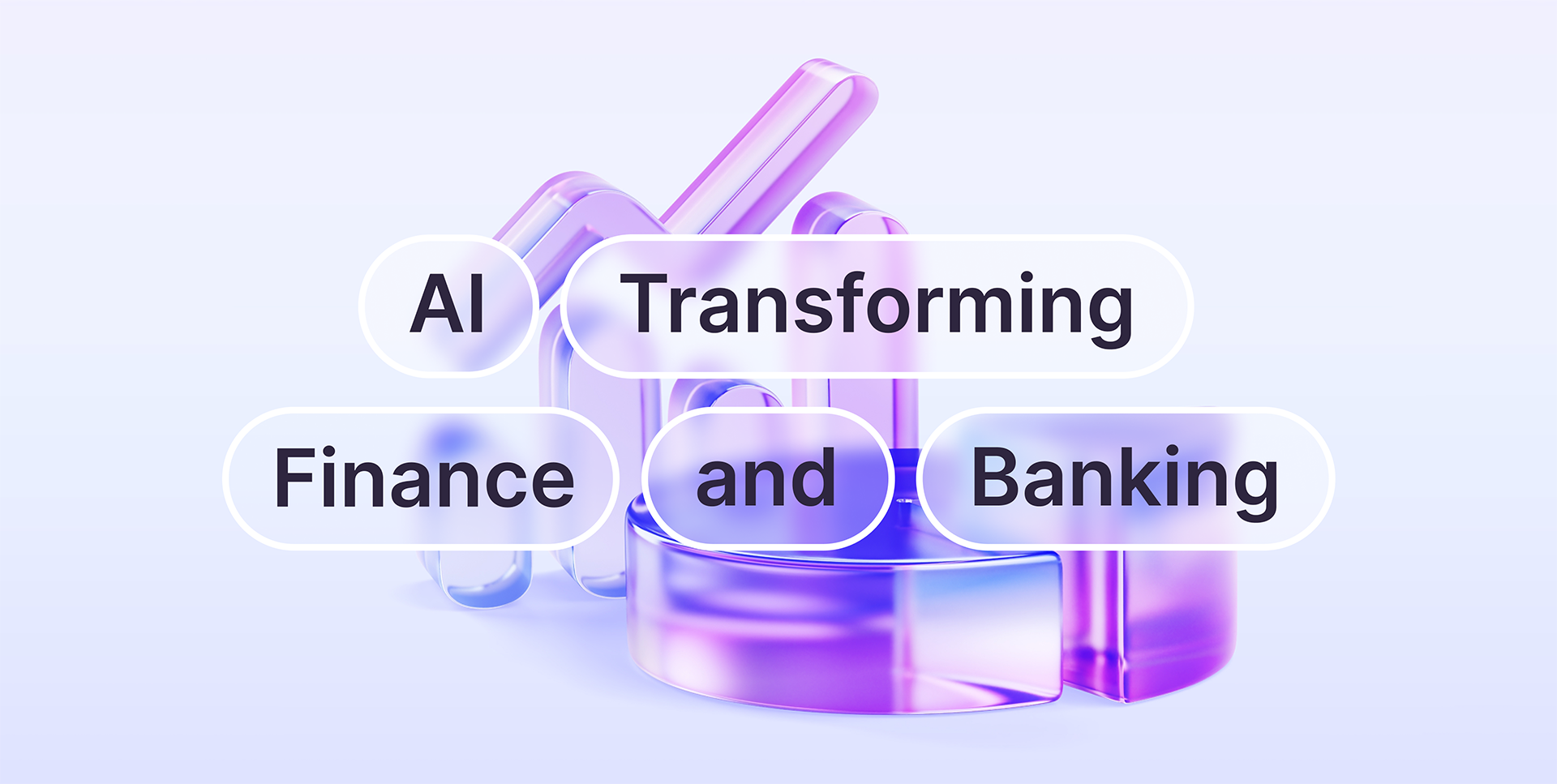The Role of AI in Finance and Banking: A New Era of Innovation
• Customer Support
• FastBank

Banking and finance aren't what they used to be. With the rise of AI in finance, everything from managing money to approving loans has become faster, smarter, and more personalized.
Think about how often you interact with your bank without even realizing it - your credit card flags a suspicious transaction before you notice, your banking app suggests a smarter way to save, or a chatbot answers your loan questions instantly. That's AI in banking quietly reshaping the way we handle money.
It's no surprise that the global market size of AI in banking is projected to hit $34.58 billion in 2025 and skyrocket to around $379.41 billion by 2034.
So, where is all this heading? As artificial intelligence in finance continues to evolve, the industry is stepping into a new era of innovation - one that's redefining the reality in the banking and financial sectors.
Let's explore how this transformation is unfolding and what it means for the future of finance.
The Transformative Link Between AI and Financial Services
Banks and financial institutions handle an overwhelming amount of data every second. Every transaction, loan application, and customer interaction generates valuable insights - too much for humans to process alone. That's where AI in finance comes in, making sense of all that data in real time.
The impact of AI in banking goes beyond convenience. It's reshaping risk management, streamlining operations, and personalizing financial services. As a result, we get a banking experience that's faster and more intuitive for both businesses and individuals.
And it's not just about speed - AI in finance is making banking smarter in ways we actually feel. Have you ever had your card blocked because of a "suspicious" purchase that was totally normal? AI is changing that. Instead of relying on rigid rules, AI-powered fraud detection learns from your spending habits, so it can tell the difference between actual fraud and just you splurging on a weekend getaway.
Loan approvals are getting a much-needed upgrade, too. Instead of making decisions based on outdated credit score models, AI considers a broader picture - your spending patterns, income trends, and even alternative data - making approvals more fair, especially toward those with limited credit history.
Then there's customer support. No more waiting on hold for simple banking questions - AI chatbots and virtual assistants are handling routine inquiries instantly on a wide range of topics, aside from the ones mentioned above. On top of that, AI ensures human agents jump in with the full context, so you're not repeating yourself.
As a result, financial institutions manage to automate 90% of the incoming basic queries while cutting costs and boosting CSAT scores. AI-powered tools like Hoory AI allow businesses to create banking chatbots with custom conversation flows and use them for specific financial needs, such as advice on mortgage plans, investment options, and other financial inquiries.
In short, AI in banking is actively making money management more secure, and way less frustrating.
The Risks of Using Artificial Intelligence in Finance
AI has definitely shaken up the finance world for the better in many ways, but it's not all smooth sailing. There are some risks that come with relying on AI to handle sensitive financial decisions. Here's a quick look at a few things to watch out for:
-
Privacy Concerns: AI learns a ton of data to work effectively, and that often means personal customer information. If this data isn't protected properly, it opens the door to serious privacy issues, potentially putting customers at risk.
-
Bias in Decision-Making: AI systems learn from past data, which can sometimes include biased or incomplete information. Thus, it could lead to unfair outcomes, like biased loan approvals or inaccurate credit scoring.
-
Lack of Transparency: AI decision-making can feel like a black box - often, it's tough to figure out how the system arrived at a particular conclusion. This lack of transparency can be a problem, especially when real money is on the line.
-
Security Vulnerabilities: The more we rely on AI, the more attractive it becomes as a target for hackers. If not properly protected, AI systems can become weak points in the security chain, leading to potential data breaches or fraud.
-
Over-Automation: AI is great for efficiency, but too much automation can be dangerous. Sometimes, human intuition and oversight are needed to catch mistakes that AI might miss - relying too heavily on it could backfire if something goes wrong.
AI in Banking: Shaping the Future of Digital Banking
AI is making its mark in banking, but not always in ways you'd expect. As for chatbots, they've gone from simple "How can I help?" scripts to actual problem-solvers handling everything from account inquiries to appointment scheduling.
Beyond chatbots, AI is also transforming other areas for banking.Financial institutions are also using AI to help with managing complex regulations and making decisions based on large datasets. For example, private equity consulting in UAE is beginning to use AI tools to analyze investment risks and market trends, offering better insights into financial opportunities and challenges. From automated fraud detection systems that constantly monitor transactions for suspicious activity to personalized financial advice that adapts based on your spending habits, AI is creating a more tailored, proactive experience for customers.
The Risks of Using Artificial Intelligence in Banking
-
Ethical Dilemmas: AI has to make some tough calls, and sometimes it's hard to know where to draw the line. For example, AI must decide to approve or deny loans based on patterns in data, but what if the data used is biased? This raises the question of whether AI can make fair decisions, and who's responsible if it doesn't.
-
Difficulty in Handling Complex Cases: AI thrives when it's dealing with simple, routine tasks, but when things get complicated, it can struggle. For example, if a customer has a unique issue, like an error in their account that may require human judgement and empathy, AI might not be able to resolve it effectively. In these situations, having a human to step in makes all the difference.
-
Security Vulnerabilities: As banks integrate AI, they're creating more entry points for hackers. AI systems handle sensitive information, which makes them prime targets for cyberattacks. If these systems are not properly protected, hackers could exploit vulnerabilities, compromising security and customer trust.
-
Regulatory Challenges: AI in banking is moving faster than the rules that are supposed to govern it. Banks might be using AI in ways that aren't fully covered by current regulations, which could cause legal headaches down the line. There's a constant struggle between keeping up with new technology and making sure that everything stays within the legal lines.
How to Use AI in Finance and Banking Securely?
-
Secure Customer Data: Make sure you encrypt everything and keep data protected, whether it's being sent or stored. The more secure the data, the safer your customers will feel.
-
Regular Security Checks: AI systems are always evolving, so run security audits regularly. It's like getting a check-up for your AI - catchy vulnerabilities before they become big problems.
-
Choose Transparent AI: AI can be tricky to understand. Use models that explain their decisions, especially in finance. Customers should know how AI arrived at important financial choices.
-
Keep Humans Involved: AI is great, but it's not perfect, as we've come to realize. For tricky situations, always have humans double-check the decision-making process. This keeps things balanced and less risky.
-
Stay on Top of Regulations: Laws are always catching up to new tech, so stay aware of the latest rules around data privacy and financial regulations. Staying compliant helps avoid penalties and keeps you ahead of the game.
Real-World Examples of AI in Banking and Finance
Commonwealth Bank of Australia
Commonwealth Bank of Australia is one of the largest banks in the country, onboarding hundreds of thousands of customers every year. With such a large volume of new customers, they've got to make sure they're ticking all the boxes when it comes to compliance, risk policies, and KYC (Know Your Customer) process. Normally, this involves a lot of time-consuming work from bank clerks who have to extract and verify information from customer IDs, driver's licenses, and birth certificates.
To streamline the process, they decided to make things a whole lot easier with H2O Document AI. This AI technology automatically extracts key details like names, addresses, and places of birth in a structured way. Traditional OCR (Optical Character Recognition) systems, for example, often struggle with documents that have a poor quality. But with H2O's AI, they get higher accuracy and smoother processing across all kinds of documents.
Thanks to H2O's mix of AI models, Commonwealth Bank has been able to automate the process of classifying documents and applying advanced NLP models to extract and manage text. The result? Faster onboarding, happier customers, and more efficient operations.
Federal Bank Limited
Federal Bank has taken customer service to a new level with the help of an advanced AI personal assistant, and the results speak for themselves. With near 100% response accuracy, they've been able to boost customer satisfaction by 25% - making customers trust the AI even with more complex banking transactions.
The bank has experimented with several conversational AI solutions, but Dialogflow stood out as the perfect fit. It ticked all the boxes when it came to accuracy, versatility, and contextual understanding. That's when they partnered with Riafy Technologies, unlocking the full potential of Dialogflow and creating a virtual assistant that felt like talking to a real person.
This assistant, named Feddy, quickly became a trusted assistant, helping millions of customers across India in their banking needs, all while making the AI experience more lifelike and efficient. It's safe to say Feddy has earned its spot as a beloved virtual agent in the hearts of Federal Bank customers.
Banca Meidolanum
At Banca Mediolanum, with over 2.2 million customers, risk management touches every corner of the bank. One of the biggest shifts they've made recently is in how they approach credit scoring - something that directly impacts lending and customer relations. To make this process even more reliable, the bank decided to leverage advanced AI technologies, including machine learning, to refine the accuracy of their credit scoring models.
The bank's investment in advanced analytics has not only made the transition smooth but also helped them exceed the €30 billion mark in assets on their latest balance sheet.
All in all, Banca Meidolanum's move to AI-powered analytics is paying off, and it's clear they're on the right path to continued success.
The Future of AI in Banking and Financial Sectors
AI in banking is moving fast - like, really fast. Soon, your bank might know your spending habits better than you do. Imagine getting a friendly nudge before splurging on something you'll regret or your AI assistant finding you a lower interest rate without you even asking.
But let's be real: AI still has its issues. We've seen biased algorithms mess up loan approvals, and security concerns aren't going away anytime soon. That's why the future isn't about more AI - it's about better AI, with smarter safeguards and a human touch where it matters.
At the end of the day, AI isn't here to replace your bank - it's here to make banking work better for you. The banks that figure this out? They'll be the ones leading the way.

























